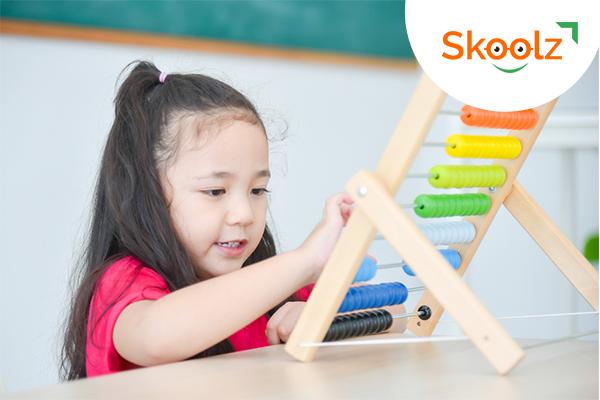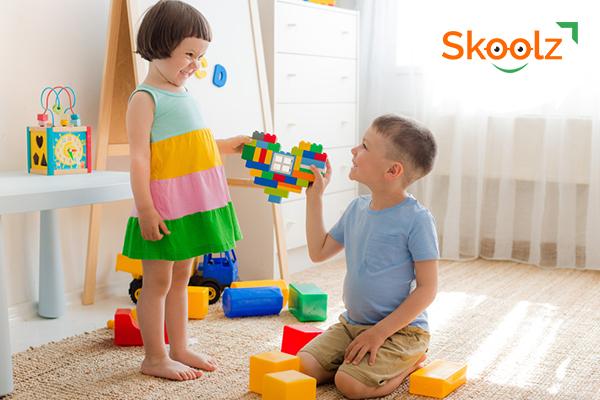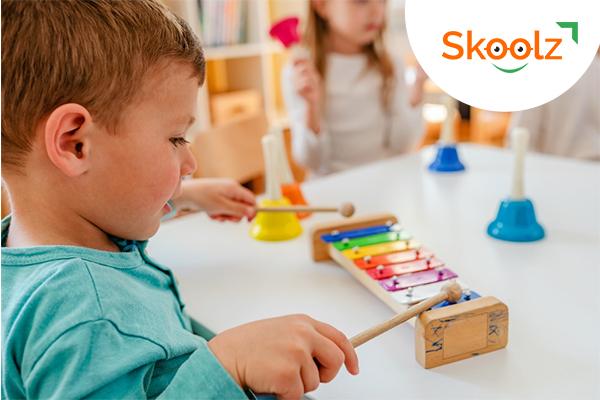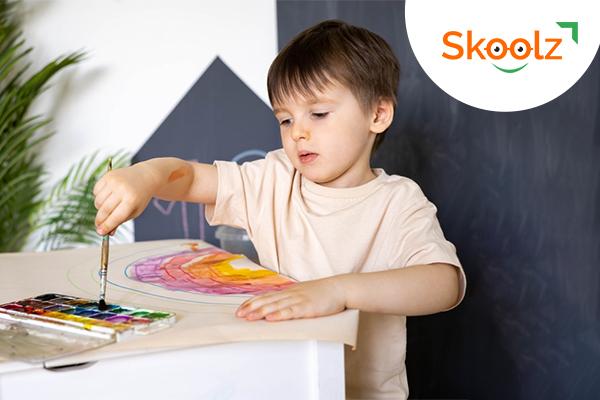
Nurturing Young Minds: The Power and Importance of Preschool Education
Nurturing Young Minds: The Power and Importance of Preschool Education
Preschool education plays a vital role in shaping a child's early development and preparing them for a lifetime of learning. It is during these formative years that children build a solid foundation for future academic and social success. In this blog, we will explore the significance and importance of preschool education, its benefits, address frequently asked questions, and provide a disclaimer. If you're searching for the top preschool in your area, visit skoolz.in to find the perfect match with just one click.
The Importance of Preschool Education:
Early Brain Development:

Preschool education promotes early brain development by stimulating cognitive, social, and emotional growth. It provides a nurturing environment that fosters curiosity, critical thinking, and problem-solving skills. The early years are crucial for brain development, and preschool sets the stage for a child's future learning potential.
Socialization and Emotional Development:

Attending preschool allows children to interact with their peers, learn to share, collaborate, and develop essential social skills. They also learn to manage emotions, build relationships, and gain independence. Preschool provides a safe and supportive environment where children can develop their social and emotional intelligence.
Language and Communication Skills:

Preschool introduces children to language and literacy skills through storytelling, rhymes, and interactive activities. It helps develop vocabulary, listening skills, and lays the foundation for reading and writing. Strong language and communication skills acquired in preschool have a lasting impact on a child's academic and personal success.
Structured Learning Environment:

Preschools offer a structured learning environment that introduces routines, promotes discipline, and develops essential self-regulation skills. Children learn to follow instructions, manage their time, and develop a sense of responsibility. This structured environment fosters a love for learning and prepares children for the academic expectations of future schooling.
Creativity and Motor Skills:

Preschools provide opportunities for creative expression through art, music, and imaginative play. They also focus on developing fine and gross motor skills, coordination, and spatial awareness through various activities. These experiences nurture a child's creativity and physical development.
FAQs about Preschool Education:
Q1. At what age should my child start preschool?
A: Most children start preschool between the ages of 3 and 5, depending on their readiness and local regulations. Starting preschool at an early age allows children to benefit from the developmental advantages it offers.
Q2. What should I look for in a preschool?
A: Consider factors such as a safe and stimulating environment, qualified and caring teachers, a balanced curriculum, opportunities for play-based learning, parent involvement, and positive peer interactions. Choose a preschool that aligns with your child's individual needs and interests.
Q3. How long is a typical preschool day?
A: Preschool schedules vary, but most programs offer half-day sessions (2-4 hours) or full-day sessions (6-8 hours). Choose a schedule that suits your child's needs and your family's routine.
Q4. What is the role of play in preschool education?
A: Play is an essential component of preschool education as it promotes social, emotional, cognitive, and physical development. It allows children to explore, experiment, and learn through hands-on experiences, fostering creativity and problem-solving skills.
Q5. How can I support my child's preschool learning at home?
A: Support your child's learning by providing a stimulating home environment, reading together, engaging in conversations, encouraging creativity, and extending their learning through educational activities. Collaborate with teachers to reinforce the concepts learned at preschool.
Visit skoolz.in to Find the Top Preschool in Your Area:
Discover the top preschools in your area effortlessly at skoolz.in. Their user-friendly platform provides a comprehensive database of preschools, making it easy to explore and compare options. With just one click, you can find the ideal preschool that nurtures your child's potential and sets them on a path of educational success.
Disclaimer:
The views and opinions expressed in this blog are solely those of the author and do not necessarily reflect the views of www.skoolz.in or its affiliates. It is important to conduct thorough research, visit preschools, and consider various factors before making a decision about your child's education. The information provided in this blog is for general informational purposes only and should not be considered as professional advice. Parents should consult with educators and professionals for personalized guidance and to address specific concerns regarding their child's preschool education.
Conclusion:
Preschool education is a critical stepping stone in a child's educational journey, fostering early brain development, socialization, and academic readiness. It provides a structured learning environment that nurtures creativity, language skills, and motor development. The importance of preschool education lies in its ability to set a solid foundation for a child's future success in academics and beyond. By addressing frequently asked questions, we have shed light on common concerns parents may have about preschool education. Remember to visit https://www.skoolz.in/ to find the top preschool in your area and provide your child with a strong foundation for lifelong learning.
Note: The views and opinions expressed in this blog are solely those of the author and do not necessarily reflect the views of skoolz.in or its affiliates. It is important to conduct thorough research, visit preschools, and consult with educators before making decisions about your child's education.
 Written by:
Written by:
Bhawana Mohane
Digital Marketer

Nurturing Young Minds: The Power and Importance of Preschool Education
Preschool education plays a vital role in shaping a child's early development and preparing them for a lifetime of learning. It is during these formative years that children build a solid foundation for future academic and social success. In this blog, we will explore the significance and importance of preschool education, its benefits, address frequently asked questions, and provide a disclaimer. If you're searching for the top preschool in your area, visit skoolz.in to find the perfect match with just one click.
The Importance of Preschool Education:
Early Brain Development:

Preschool education promotes early brain development by stimulating cognitive, social, and emotional growth. It provides a nurturing environment that fosters curiosity, critical thinking, and problem-solving skills. The early years are crucial for brain development, and preschool sets the stage for a child's future learning potential.
Socialization and Emotional Development:

Attending preschool allows children to interact with their peers, learn to share, collaborate, and develop essential social skills. They also learn to manage emotions, build relationships, and gain independence. Preschool provides a safe and supportive environment where children can develop their social and emotional intelligence.
Language and Communication Skills:

Preschool introduces children to language and literacy skills through storytelling, rhymes, and interactive activities. It helps develop vocabulary, listening skills, and lays the foundation for reading and writing. Strong language and communication skills acquired in preschool have a lasting impact on a child's academic and personal success.
Structured Learning Environment:

Preschools offer a structured learning environment that introduces routines, promotes discipline, and develops essential self-regulation skills. Children learn to follow instructions, manage their time, and develop a sense of responsibility. This structured environment fosters a love for learning and prepares children for the academic expectations of future schooling.
Creativity and Motor Skills:

Preschools provide opportunities for creative expression through art, music, and imaginative play. They also focus on developing fine and gross motor skills, coordination, and spatial awareness through various activities. These experiences nurture a child's creativity and physical development.
FAQs about Preschool Education:
Q1. At what age should my child start preschool?
A: Most children start preschool between the ages of 3 and 5, depending on their readiness and local regulations. Starting preschool at an early age allows children to benefit from the developmental advantages it offers.
Q2. What should I look for in a preschool?
A: Consider factors such as a safe and stimulating environment, qualified and caring teachers, a balanced curriculum, opportunities for play-based learning, parent involvement, and positive peer interactions. Choose a preschool that aligns with your child's individual needs and interests.
Q3. How long is a typical preschool day?
A: Preschool schedules vary, but most programs offer half-day sessions (2-4 hours) or full-day sessions (6-8 hours). Choose a schedule that suits your child's needs and your family's routine.
Q4. What is the role of play in preschool education?
A: Play is an essential component of preschool education as it promotes social, emotional, cognitive, and physical development. It allows children to explore, experiment, and learn through hands-on experiences, fostering creativity and problem-solving skills.
Q5. How can I support my child's preschool learning at home?
A: Support your child's learning by providing a stimulating home environment, reading together, engaging in conversations, encouraging creativity, and extending their learning through educational activities. Collaborate with teachers to reinforce the concepts learned at preschool.
Visit skoolz.in to Find the Top Preschool in Your Area:
Discover the top preschools in your area effortlessly at skoolz.in. Their user-friendly platform provides a comprehensive database of preschools, making it easy to explore and compare options. With just one click, you can find the ideal preschool that nurtures your child's potential and sets them on a path of educational success.
Disclaimer:
The views and opinions expressed in this blog are solely those of the author and do not necessarily reflect the views of www.skoolz.in or its affiliates. It is important to conduct thorough research, visit preschools, and consider various factors before making a decision about your child's education. The information provided in this blog is for general informational purposes only and should not be considered as professional advice. Parents should consult with educators and professionals for personalized guidance and to address specific concerns regarding their child's preschool education.
Conclusion:
Preschool education is a critical stepping stone in a child's educational journey, fostering early brain development, socialization, and academic readiness. It provides a structured learning environment that nurtures creativity, language skills, and motor development. The importance of preschool education lies in its ability to set a solid foundation for a child's future success in academics and beyond. By addressing frequently asked questions, we have shed light on common concerns parents may have about preschool education. Remember to visit https://www.skoolz.in/ to find the top preschool in your area and provide your child with a strong foundation for lifelong learning.
Note: The views and opinions expressed in this blog are solely those of the author and do not necessarily reflect the views of skoolz.in or its affiliates. It is important to conduct thorough research, visit preschools, and consult with educators before making decisions about your child's education.
 Written by:
Written by:
Bhawana Mohane
Digital Marketer




